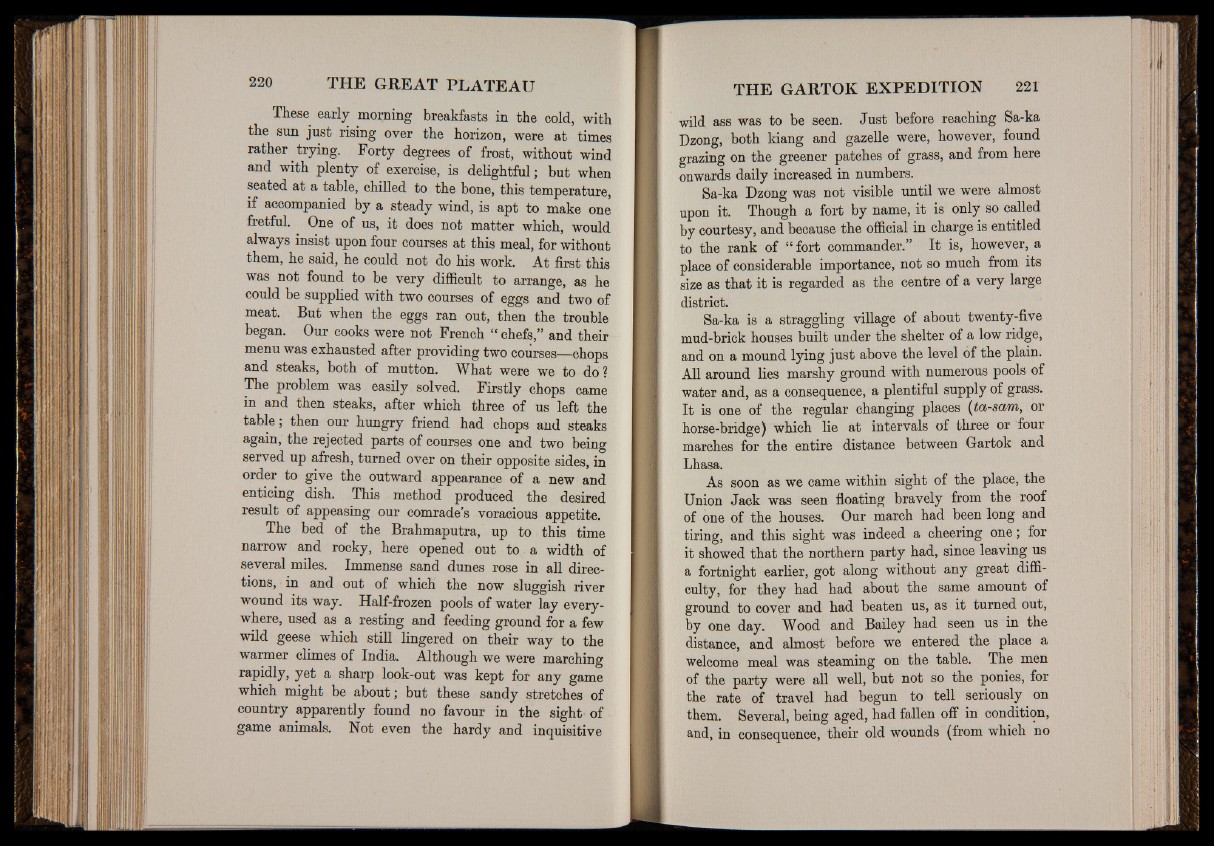
These early morning breakfasts in the cold, with
the sun just rising over the horizon, were at times
rather trying. Forty degrees of frost, without wind
and with plenty of exercise, is delightful; but when
seated at a table, chilled to the bone, this temperature,
if accompanied by a steady wind, is apt to make one
fretful. One of us, it does not matter which, would
always insist upon four courses at this meal, for without
them, he said, he could not do his work. At first this
was not found to be very difficult to arrange, as he
could be supplied with two courses of eggs and two of
meat. But when the eggs ran out, then the trouble
began. Our cooks were not French “ chefs,” and their
menu was exhausted after providing two courses—chops
and steaks, both of mutton. What were we to do?
The problem was easily solved. Firstly chops came
in and then steaks, after which three of us left the
table; then our hungry friend had chops and steaks
again, the rejected parts of courses one and two being
served up afresh, turned over on their opposite sides, in
order to give the outward appearance of a new and
enticing dish. This method produced the desired
result of appeasing our comrade’s voracious appetite.
The bed of the Brahmaputra, up to this time
narrow and rocky, here opened out to a width of
several miles. Immense sand dunes rose in all directions,
in and out of which the now sluggish river
wound its way. Half-frozen pools of water lay everywhere,
used as a resting and feeding ground for a few
wild geese which still lingered on their way to the
warmer climes of India. Although we were marching
rapidly, yet a sharp look-out was kept for any game
which might be about; but these sandy stretches of
country apparently found no favour in the sight of
game animals. Not even the hardy and inquisitive
wild ass was to be seen. Just before reaching Sa-ka
Dzong, both kiang and gazelle were, however, found
grazing on the greener patches of grass, and from here
onwards daily increased in numbers.
Sa-ka Dzong was not visible until we were almost
upon it. Though a fort by name, it is only so called
by courtesy, and because the official in charge is entitled
to the rank of “ fort commander.” It is, however, a
place of considerable importance, not so much from its
size as that it is regarded as the centre of a very large
district.
Sa-ka is a straggling village of about twenty-five
mud-brick houses built under the shelter of a low ridge,
and on a mound lying just above the level of the plain.
All around lies marshy ground with numerous pools of
water and, as a consequence, a plentiful supply of grass.
It is one of the regular changing places (ta-sam, or
horse-bridge) which lie at intervals of three or four
marches for the entire distance between Gartok and
Lhasa.
As soon as we came within sight of the place, the
Union Jack was seen floating bravely from the roof
of one of the houses. Our march had been long and
tiring, and this sight was indeed a cheering one; for
it showed that the northern party had, since leaving us
a fortnight earlier, got along without any great difficulty,
for they had had about the same amount of
ground to cover and had beaten us, as it turned out,
by one day. Wood and Bailey had seen us in the
distance, and almost before we entered the place a
welcome meal was steaming on the table. The men
of the party were all well, but not so the ponies, for
the rate of travel had begun to tell seriously on
them. Several, being aged, had fallen off in condition,
and, in consequence, their old wounds (from which no